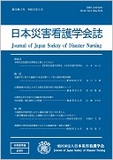Japanese
English
- 有料閲覧
- Abstract 文献概要
- 参考文献 Reference
要旨
目的:山梨県A市に居住する高齢者の防災行動と社会関係および個人特性との関連を明らかにすること。
方法:2017年、A市で質問紙調査を実施した。目的変数に防災行動3項目、説明変数に社会関係4項目と個人特性6項目を投入した多変量ロジスティック回帰分析を行った。
結果:分析対象者の高齢者637名において、3つの目的変数全てに有意な関連がみられた社会関係は「身近な人との災害についての話し合い」であった。身近な人と災害について話し合う高齢者と比べ、話し合わない高齢者は、防災訓練に参加しない(OR=1.7,95%CI=1.1-2.6,p=.015)、非常用袋を準備しない(OR=3.1,95%CI=2.1-4.5,p<.001)、ハザードマップなどに接触しない(OR=3.5,95%CI=2.4-5.2,p<.001)オッズ比が有意に高かった。
結論:対象地域において、身近な人と災害について話し合わない高齢者は、適切な防災行動をとらない傾向が示された。高齢者が適切な防災行動をとるためには、本人を巻き込み、自ら考え話すことができる場を作ることが重要であることが示唆された。
OBJECTIVES: To clarify the relationship between disaster preparedness behavior and social relations among and individual characteristics of older people living in Yamanashi prefecture.
METHODS: In 2017 a questionnaire survey was conducted in City A. Multiple logistic regression analysis was conducted with disaster preparedness behavior as the objective variable and social relations and individual characteristics as explanatory variables.
RESULTS: Among the 637 surveyed older people, the social relation behavior with a significant association with all three of the objective variables was “discussions about disasters with acquaintances.” Older people who did not discuss disasters with acquaintances, compared to older people who did have such discussions, were less likely to participate in disaster drills (OR=1.7, 95%CI=1.1-2.6, p=.015), prepare emergency bags (OR=3.1, 95%CI=2.1-4.5, p<.001), or review hazard maps (OR=3.5, 95%CI=2.4-5.2, p=.001).
CONCLUSION: Our results demonstrated that older people who do not discuss disasters with acquaintances tend not to exhibit appropriate disaster preparedness behavior in this setting. To encourage such people to develop better disaster preparedness behavior, it is important to create events where older people would have the opportunity to analyze and discuss natural disasters.
Copyright © 2019, Japan Society of Disaster Nursing All rights reserved.


